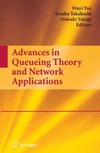Advances in Queueing Theory and Network Applications presents several useful mathematical analyses in queueing theory and mathematical models of key technologies in wired and wireless communication networks such as channel access controls, Internet applications, topology construction, energy saving schemes, and transmission scheduling. In sixteen high quality chapters, this work provides novel ideas, new analytical models, and simulation and experimental results by experts in the field of queueing theory and network applications.
The text serves as a state-of-the-art reference for a wide range of researchers and engineers engaged in the fields of queueing theory and network applications, and can also serve as supplemental material for advanced courses in operations research, queueing theory, performance analysis, traffic theory, as well as theoretical design and management of communication networks.
 |
|
О проекте
|
|
О проекте


